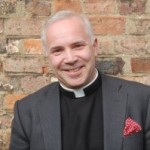 The Very Revd Dr David Hoyle, Dean of Bristol Cathedral, writes to the Diocese at the beginning of the new year.
The Very Revd Dr David Hoyle, Dean of Bristol Cathedral, writes to the Diocese at the beginning of the new year.Just by the Roman Forum there is a marble arch, nearly 2,000years old. It is built to celebrate the victory that Titus won in the first Jewish War. Covered in carvings, at the top there is Titus himself, flying in to heaven on the back of an eagle. It is what they call an apotheosis; no longer Titus the man, but Titus becoming a god.
Thats what Romans believed that men and women could actually become gods. It probably sounds a bit odd, dreaming of riding to heaven on the wings of an eagle, but the desire to be a bit more than human is actually a pretty basic temptation. Behind it is the idea that I could do better than this, if I try, I could make something of myself. It is the New Year temptation, all those resolutions we make to be svelte and shiny and improved.
New Year resolutions are designed to make us better. Whether it is taking something on, like running on the Downs every morning, or giving something up, like sherry for breakfast, we aim to be better than we are. No harm in that, providing we are alert to the temptation that effort always brings. Standing before the mirror after a run on the Downs theres a ghastly tendency to think Havent I done well?, a tendency to start admiring oneself.
That was the Roman disease. It was, and is, the temptation to aim at being more than human, the temptation to take charge of ourselves. You may think that pride is only for people who are really pleased with themselves, a sin for high achievers. Its nothing of the sort. Pride is just another name for the sin that thinks that I am the great work in progress and (with a bit more running and a little less sherry) I might finally get it right.
In January we arrive at Epiphany. It is the moment when kings come to meet a baby. It is the moment power bows down to frailty. Epiphany is a lesson about pride and effort. The Kings did not kneel at the crib to admire a superhuman. This first glimpse of the God amongst us, is a glimpse of frailty and dependence. That is how God takes human form.
Christ turned the ambition of Titus on its head. Here was a god who came to us and lived as one of us. Christ was, in fact, the one person who has lived a life in which he neither imposed himself nor apologised for himself. He never sought to be more or less than human. Again and again he resisted the invitation to take charge, impose himself, or do it better. The devil in the wilderness, Pilate in the forum, the crowd at the foot of the cross, and even his own disciples all tempted him to do something more. He would not. He never sought to take charge, he never tried to escape. Christ knew the great good news that it is God, and not our own effort, that will redeem us. Christ was the great good news that it is in being properly human that we can come close to God.
Good luck with your New Year resolutions. I have some myself, but let us make it our chief resolution to praise God and not ourselves.
The Very Revd Dr David Hoyle
Dean of Bristol